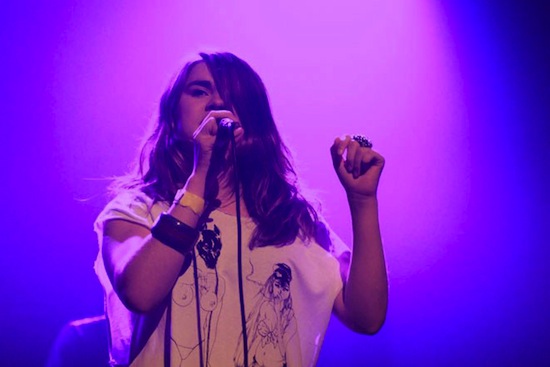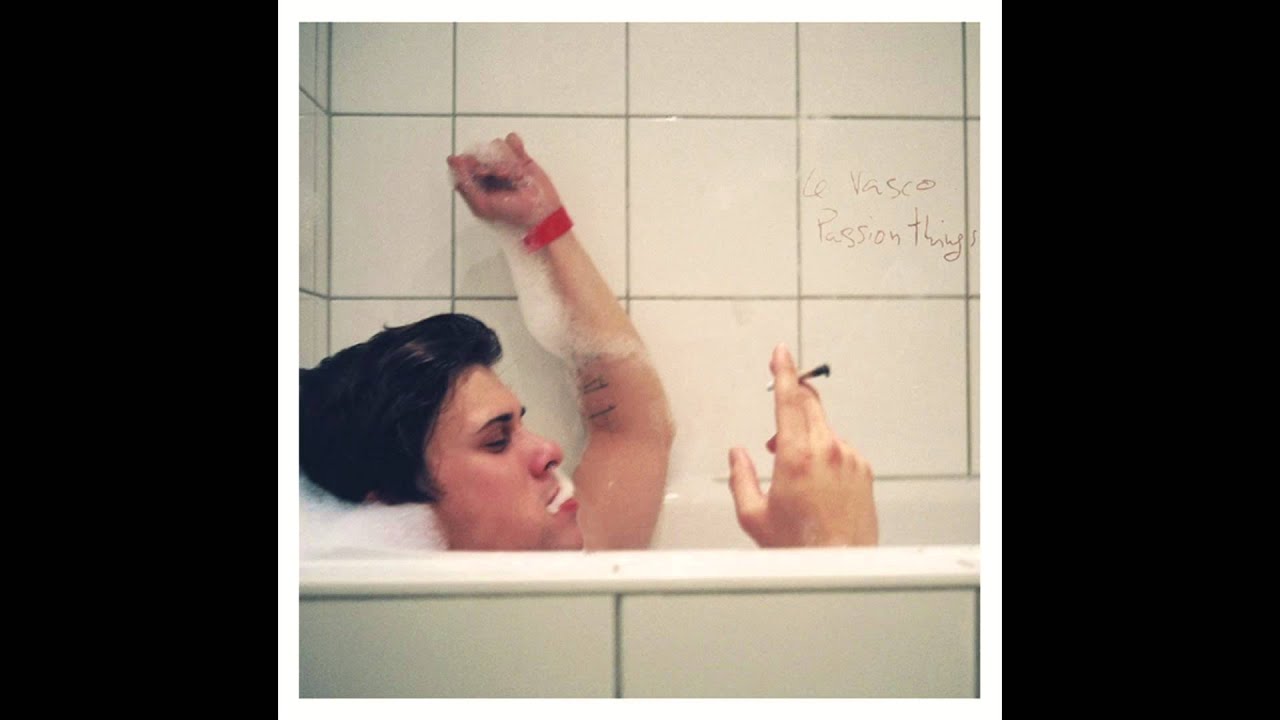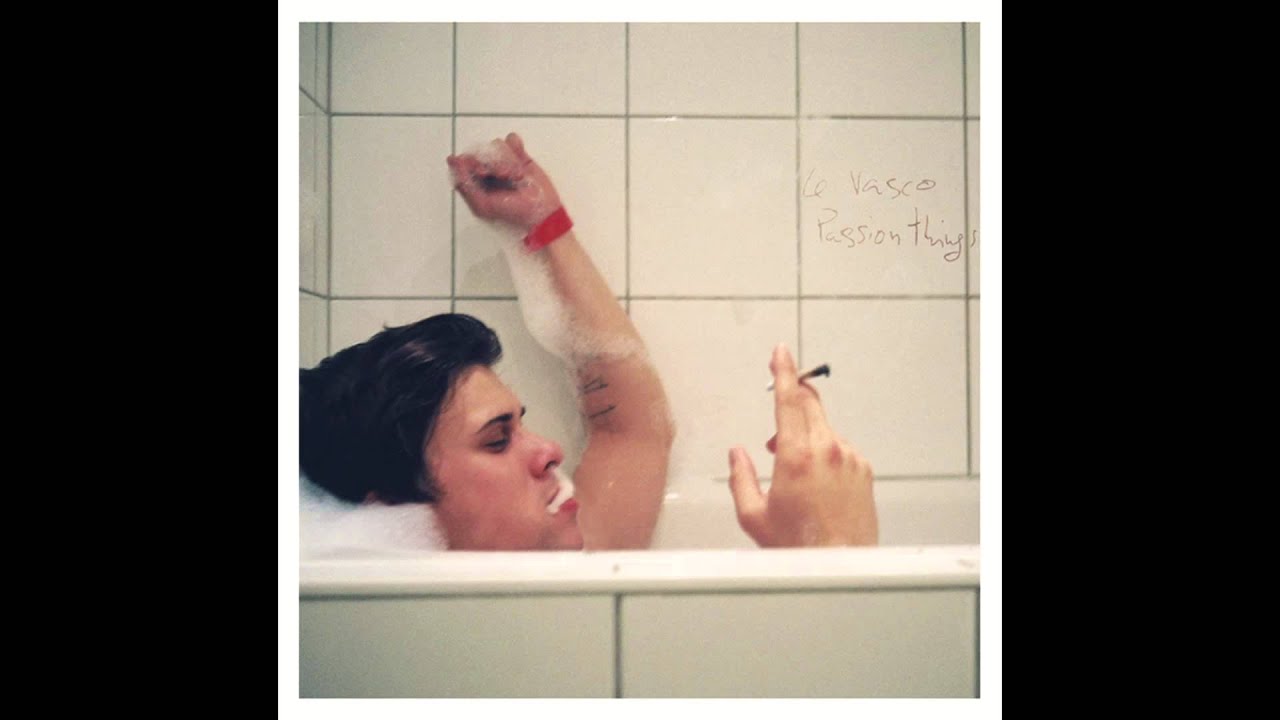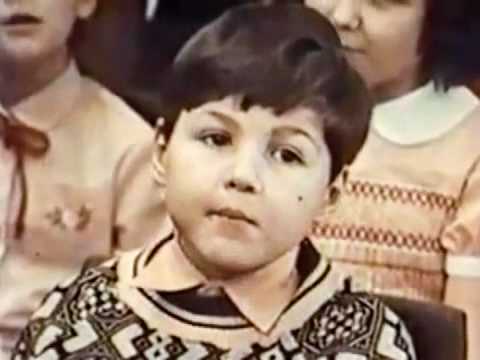So I ended up seeing them four times during one week in May, the same set essentially but always the fresh excitement of watching the faces of audience members register bewilderment then growing curiosity before finally bursting into delirious grins and wild stares. For the first one, which also happened to be their first UK show, in the incongruous outdoor setting of Kazimier Gardens in Liverpool, there was initially no sound apart from the monitors on stage. They powered through anyway.
Louise Calzada, Le Vasco’s singer (sweet, charming as can be in conversation; a "tigress", to quote her lyrics, on stage) reckons that "the difficult shows can also be highly emotionally charged. In Liverpool we had to do a very quick soundcheck, it was all a bit of a mess, but it gave us a sort of rage, a desire to give everything in the show. We’re going to play our music in spite of the conditions." Those conditions have included playing in a squat in Novi Sad, the second most populous city in Serbia, where the only illumination came from Christmas lights and a miner’s lamp worn by Louise.
About half way through the Liverpool set, I notice a guy next to me giving ‘WTF?’ looks to his friend across the way. He then turns to me and announces that he can’t figure out if this is the worst or the best thing he’s ever seen. He says it like he genuinely needs help resolving the conundrum. I tell him I think they’re great but, given that he seems almost overcome with excitement, I suppose that sooner or later the answer would have come without my assistance.
This response was not an isolated one either – I saw it replicated in London, at a Pop Noire party in Dalston, and then twice at the Great Escape festival Brighton. A group that can inspire such intense reactions in people is a rare and precious thing.
Says Louise: "Surprise is really the word we hear most often from people who come to talk to us after shows, but then what’s really cool is already the fact that people want to talk to us after shows, so they feel a need to express something, to tell us, ‘Oh, it made me think of this or that.’ There was one guy yesterday who said, ‘I started to listen, and it sounded a bit like something I know, maybe hip hop, I started dancing and then suddenly it stops and becomes something more aggressive.’ He said that he was surprised so he just stood there stock still… which is weird for us, because sometimes we think, ‘Shit, they’re not dancing, they’re not responding!’ but in fact they’re just listening."
Le Vasco have been welcomed into the Pop Noire family, with (as I understand it) a publishing deal for the time being. Prior to this, there have been two releases: a Le Vasco EP and a free-to-download mixtape, Passion Things. The former bunny-hops between R&B, hip hop, rap-rock, electro-pop, noise, dubstep, maybe klezmer techno, an intimate and genuinely moving ballad, ‘Goodbye’. Nicolas Rode’s saxophone can be tender and eerie or the source of spasmodic action-painting splatters. Passion Things, not being a ‘proper’ release, is even more sketchy and schizophrenic. There are a lot of drop-outs in their tracks, sudden left turns, false starts and stops. Savages/Pop Noire’s Jehnny Beth told an interviewer on Australian radio station Triple J that, "They (Le Vasco) know how to use silence." As well as being a neat way of referring back to Savages’ own Silence Yourself and anointing Le Vasco as a suitably Pop Noire-ish project, it’s also undoubtedly true.
Baptiste Pelsy (guitar): "It was something we had from the beginning, the idea of trying to create tension in the music, to conceive of our music in a way that the listener couldn’t remain passive, to make them active as listeners. So I think silence in music is very important and has a tendency to be forgotten. After that, silence takes a number of forms, it’s not necessarily nothing, and even when there’s nothing at all it’s not necessarily nothing either. So that was the aim in a way, to try to articulate that in music that is sometimes very dense, highly percussive, brutal, sometimes more delicate. And that’s what’s interesting, to try to integrate silence and create moments of tension in the songs and throughout the set so that the listener doesn’t just lose themselves… I don’t know, I’ve never been in the audience for Le Vasco! But I don’t think I could just stand there and just experience some sort of vague enjoyment."
The stage, in case that wasn’t already abundantly clear, is where Le Vasco go into a higher gear. The first time I saw them, at Les Transmusicales de Rennes in December last year, the set was leavened by a few of their gentler moments, like ‘A Legend’ from Passion Things but the UK shows were, of necessity, brutally condensed. They came in hard, with ‘I’m Not There’, and only got more aggressive from there. That partly explains the mounting excitement the shows generated but there’s also those silences, which become more charged as the band train you to listen to them, to know that you’re not going to know how long they’ll last and that you probably can’t guess what’s going to happen on the other side – except that it will probably involve Louise (temporarily but barely restrained, hopping from one foot to the other in anticipation) exploding again.
I’d already heard they had a background in jazz. Nils Peschanski, who plays keyboards and appears to be the most vociferous of the group alongside Louise, confirms: "Yes, jazzy, groove-based, very instrumental, solos. We had a drummer but at a certain point we stopped playing with him and decided to start again from the ground up and that was the beginning of Le Vasco." There’s an interlude on Passion Things called ‘Histoire de Vasco’ – so, what is the histoire?
Nils Peschanski: "This interlude on the mixtape is Georges Schehadé’s statement of intent before writing his play Histoire de Vasco (The Story Of Vasco) and it was there that Louise found the name. The article was to add a bit of mystery to the name of the group. We thought it was interesting to put that text directly on the mixtape, to make the link. Otherwise the story of the group is pretty straightforward. Broadly, we’ve all studied art in one way or another, and we’d already had a group together for a while."
I hesitate to use the word ‘characters’ but each member of the group has a well-defined persona on stage – Louise jumps and grinds, Raphael Hardy – who plays all the beats live on his MPC (nothing is sequenced) – stands stock-still with only his lower arms moving like those of a mechanical toy drummer, Nils is affable and not afraid of a bit of physical comedy, Nicolas likes to stay hooded and moody and Baptiste is all understated cool.
LC: "I think the aim of a live show, at least as we’ve wanted to do it ourselves, is to be fully open on stage. Obviously normally we’re caught up in daily life but the live show allows us to put forward certain personality traits and develop them."
In the lyrics, there’s a hip hop thing, fronting, the "tigress", but ‘I’m Not There’ goes the other way, it seems to be concerned with the abdication of ego, or at least of any social status.
LC: "I don’t know, even in the more hip hop tracks there’s the idea of self-affirmation without imposing yourself on others, or living in a state of contradiction which is that I want to exist but at the same time it’s difficult, and that contradiction runs through different emotional states, whether it’s in love, anger… it’s this inherent tension of existing but also being in a social context, particularly when your teenage years are only just over and you’re starting to build a life for yourself."
Another lyric I like is ‘Le Fantôme’, with its line, "Erotic power of the castle". The explanation for the song itself reveals that the arrangement of Le Vasco’s song-fragments aren’t necessarily haphazard. Louise says that ‘Le Fantôme’ is "like a fantasy that’s being recounted, a sexual fantasy that takes place in a castle. Then there’s a brutal change of gear when you come to the words ‘Candy Crushing on my blue screen’, and that’s me playing Candy Crush on the RER, I’m totally bored with my life and I wish that this fantasy could become a reality."
With a song like that, do you talk to each other about the theme, how it might affect the structure?
BP: "The way we write, someone normally brings a small section or idea and then each of us develop it with our own instruments, we spend a lot of time discussing what kind of feeling we’re getting it from it, and Louise writes the words at the same time. So there was something sexy about the song from the beginning…"
LC: "And we all pick up on that. Afterwards it might take a turn into something more hip hop based and then we all go in that direction."
What about those hip hop and R&B influences? Do they come primarily from the US, or French acts too?
LC: "We don’t listen to a lot of French hip hop to be honest. The old stuff, we’ve got our favourite hits, but at the moment not much…"
BP: "To be honest we don’t listen to it that much, maybe Nicolas more than the rest of us…"
LC: "I listen to a lot!"
BP: "… but we all bring our own various influences that we try to absorb and use to create something new. Sometimes it’s hip hop, sometimes it’s more noise, or straight-up pop."
NR: "It’s true that sometimes it’s very close to hip hop, although I don’t think that we make hip hop…"
NP: "But we definitely went through a period of listening to Death Grips a lot, and Shabazz Palaces, all the Odd Future stuff and Tyler, The Creator and Frank Ocean after that, Kendrick Lamar, I listened a lot to Channel Orange, Louise too…"
LC: "Yes, we do listen to a lot of things and although hip hop isn’t central to what we do, it’s very important."
At the Great Escape, one of Le Vasco’s shows saw them on a line-up between two hip hop acts, Lizzo and Le1f (who failed to show, leaving Le Vasco as the climax of the evening).
BP: "Yes it was interesting and it wasn’t such a bad idea either. It’s quite interesting sometimes the line-ups we’re placed in, some quite unexpected contexts, and I think that’s a reflection of the fact that people can’t categorise us easily. Which is pretty great."
How have they been received in France?
NP: "I think people were surprised and I think that has been very strongly in our favour. Over the two years or so we’ve been together we’ve kept encountering people who had that sensation and so were keen to help us or who tried to make sense of it."
Le Vasco have played a number of dates with another hip hop influenced French act, Erotic Market, and there seems to be a genuine sense of kinship between the two. Other than that, who do they feel close to in France?
NP: "Not in terms of sounds but in terms of a desire for sincerity that is similar to ours, there’s Petit Fantôme, JC Satan, Caandides, who are good friends. It’s not the same music but there’s always that drive behind it of ‘Who are we? Who could we be?’"
Indeed, what’s key to Le Vasco’s emotional impact is their notion of sincerity, and the way their idea of sincerity doesn’t preclude humour and on-stage larks, or imagination and the dream-life.
BP: "Well, particularly the tracks where we go a bit crazier on stage were written when the group was starting, we were going for that energy, partly because we were sick of music we were hearing and the things we were playing so we went straight for something aggressive, punky even, with shouting on stage and so on."
NR: "That’s not to say that what we’re doing now is less powerful!"
BP: "No but there was this element of, ‘Look at this!’, a desire to make a statement about who we are, to have an impact that came also from our gestures, the intensity of our movements. Perhaps now we’ve attained a certain maturity…"
RH: "But emotionally it is very mixed. Like ‘Le Fantôme’ where it’s about a fantasy but the music behind it is macabre, it’s deathly. That kind of dissociation is in all our tracks but increasingly in the new ones." (The first album is most likely due early next year).
NP: "It’s funny, yesterday a radio presenter (XFM’s John Kennedy) came to talk to us. He said that our music had to come to him via Pop Noire and when he came to see us on stage he’d expected people with a ‘fuck you’ attitude, maybe a DJ dressed in black with his hair covering his eyes and what he actually saw was that we weren’t insolent at all – apart from maybe the singer! (laughs) – and that we seemed like friendly people having a good time. It’s true, that’s what we’re trying to do – we can be straightforward, we can enjoy ourselves, but it doesn’t mean we’re idiots! Simplicity can be a beautiful thing."
Rockfort also recommends this month:
Chassol – Ultrascores
There’ll be more to say about Christophe Chassol in future, with a new album on the way in the autumn, but this limited edition album – a vinyl-only ‘Best Of’-to-date on Bertrand Burgalat’s Tricatel label – is my favourite release to date, pulling together rarities, soundtrack work and unreleased tracks. The standard line is that Chassol is Philip Glass-meets-Stevie Wonder; he samples real-world sources then harmonises with (or ‘Chassolizes’ them). What’s interesting is how, despite the apparent organic warmth of his music, he ends up de-naturing his sources by putting them through this process, creating bubbles of ersatz or hybrid emotion, floating pop test-tubes and strange wallpapery sensations. The ethnographic element of his ‘Indiamore’ project, for example, seems almost incidental.
Erotic Market – Blahblahrians
Funkier and poppier than Le Vasco, Erotic Market’s take on R&B and rap is equally skewed in its own way, with bursts of distorted, punk-funk bass and odd, tingling riffs filling out a 3D mix. It represents a new direction for the Lyon-based Jarring Effects label, which was initially known for spearheading the local electro-dub scene. Erotic are a formidable live act too, with singer Marine Pellegrini looking for all the world like a star in the making.
EDH – Lava Club
A solo outing from Emmanuelle de Héricourt after last year’s Xin in the company of Hypo. Lava Club is a perfect name for this album, which sounds like EDH has been flung alone into an antechamber of hell where she has to dance amid flames and rivers of molten rock until she’s purged the sin of having a heart of ice. It’s her darkest album to date but also the most percussively accomplished.
For more from Rockfort, you can visit the official site here and follow them on Twitter. To get in touch, email info@rockfort.info





